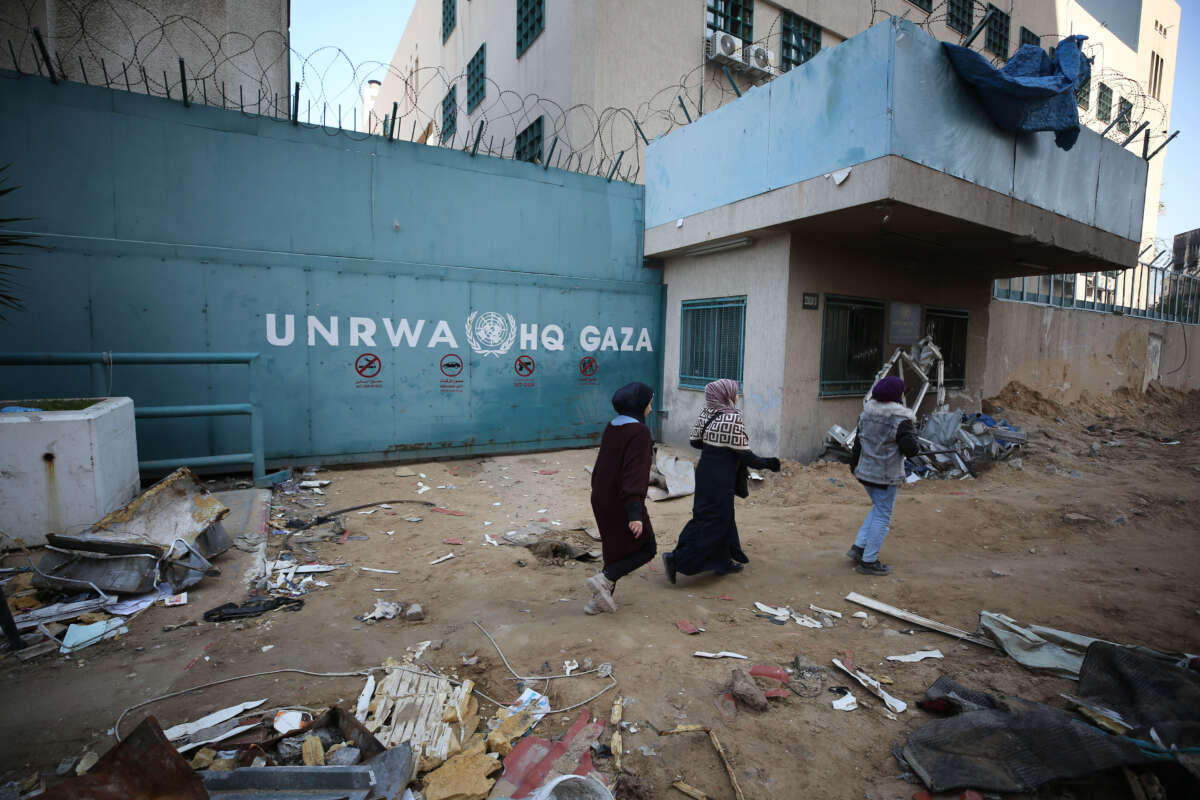Did you know that Truthout is a nonprofit and independently funded by readers like you? If you value what we do, please support our work with a donation.
The UN Relief and Works Agency for Palestine Refugees (UNRWA) is at a “breaking point” in its ability to serve Palestinians in Gaza and beyond due to relentless attacks and smears by Israeli forces, the agency’s chief said this week in a letter to the leader of the UN General Assembly pleading for the assembly to provide the political support to urge partner countries to restore funding.
In a letter to New York-based UN General Assembly President Dennis Francis, UNRWA chief Philippe Lazzarini warned that the agency will soon no longer be able to carry out its mandate because of the massive international defunding of the agency as well as moves by the Israeli government to even further suppress the agency from operating, like moving to evict the UNRWA from its headquarters in East Jerusalem, where the agency has been housed for 75 years.
“It is with profound regret that I must now inform you that the Agency has reached breaking point, with Israel’s repeated calls to dismantle UNRWA and the freezing of funding by donors at a time of unprecedented humanitarian needs in Gaza,” Lazzarini wrote to Francis, the head of the main policymaking body of the UN.
Last month, Israel accused 12 UNRWA staff — out of UNRWA’s 30,000 workers total — of being affiliated with Hamas forces and the October 7 attack. Though this spurred 16 countries so far to suspend their funding to the agency, constituting roughly 70 percent of its funding, Israel has thus far not provided evidence to donor countries of the claims. Israeli officials have also refused to provide any evidence to the UN’s special independent group probing the allegations, as Lazzarini pointed out.
On top of donor countries suspending funding, Israeli officials are attacking the UNRWA from other angles, perhaps in service of their years-long goal of dismantling the UNRWA, which is one of the only entities in the Palestinian occupied territories that Israel doesn’t control.
As Lazzarini pointed out, the Israeli Land Authority is demanding that the UNRWA vacate a training center in East Jerusalem and pay a fee of over $4.5 million. Israeli officials have limited visas for international staff to only one to two months, while an Israeli bank has blocked one of the UNRWA’s accounts. At the same time, the Israeli Knesset has launched legislative attacks against the agency, like bills to bar the UNRWA from operating in Jerusalem or remove its diplomatic immunity.
Even further, Israeli leaders have been openly calling for the UNRWA to be dismantled: in his post-Gaza assault plan presented Thursday, Israeli Prime Minister Benjamin Netanyahu called for the disbanding of the UNRWA, as Israeli forces manufacture one of the worst humanitarian disasters in modern history in terms of its speed and force. Leaders have claimed that the entire UNRWA is compromised by Hamas, despite the UNRWA operating in several territories and countries that have nothing to do with Hamas’s governance over Gaza.
“Calls today by the Government of Israel for UNRWA’s closure are not about the Agency’s neutrality,” Lazzarini warned. “Instead, they are about changing the long-standing political parameters for peace in the occupied Palestinian territory set by the General Assembly and the Security Council. They seek to eliminate UNRWA’s role in protecting the rights of Palestine Refugees and acting as a witness to their continuing plight.”
“UNRWA’s mandate embodies the promise of a political solution,” he continued. “Two weeks before the 7 October attacks, the Israeli Prime Minister presented to the General Assembly a map of a future Israel that encompassed all of Palestine; whereas UNRWA’s mandate to provide services to Palestine Refugees within this same area is an obstacle to that map becoming a reality.”
Media that fights fascism
Truthout is funded almost entirely by readers — that’s why we can speak truth to power and cut against the mainstream narrative. But independent journalists at Truthout face mounting political repression under Trump.
We rely on your support to survive McCarthyist censorship. Please make a tax-deductible one-time or monthly donation.
